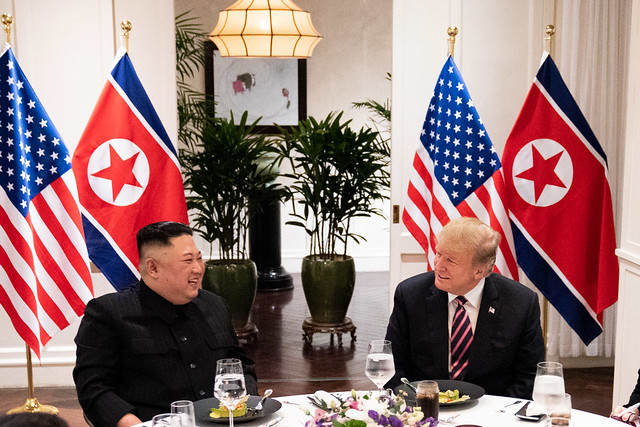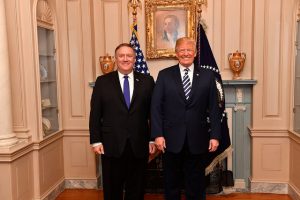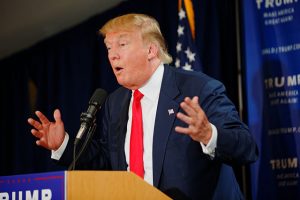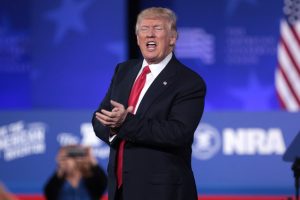by Mike Lofgren
Practically hidden among the past week’s domestic news of floods, political rallies, and helicopter crashes was the revelation that the murdered half-brother of North Korean dictator Kim Jong Un was a CIA asset, followed by President Donald Trump’s vow that he would not spy on that regime.
Trump’s statement came after concurrent publication of the allegation by the Wall Street Journal and a book by a Washington Post reporter that Kim Jong Nam, the exiled older half-brother of North Korea’s autocratic leader, had provided insights into the ruling clique in Pyongyang in exchange for cash. His assassination in Malaysia in 2017 by a North Korean hit team created an international incident and presented a stark warning of the lethal nature of the Kim dynasty’s “family business.”
But is the revelation true? We must rely on what the Journal calls a “person knowledgeable about the matter” or the Post reporter’s “two people familiar with his activities.” If these sources were officials within the U.S. intelligence community, it is difficult to imagine what national interests they thought they were advancing: a U.S. source was blown, and everyone associated with Kim Jong Nam is now in jeopardy. On the other hand, the sources (whoever they might have been) could have been foolishly recycling rumors propagated by Pyongyang for the express purpose of justifying the half-brother’s liquidation.
Similarly, the apparently incriminating evidence that when Kim Jong Nam was murdered, he was carrying $120,000 in supposed CIA cash in his backpack, is subject to differing interpretations. His lifestyle could also explain the cash: the Post piece that takes as a given that he was a CIA asset, also says he “lived among the gamblers and gangsters of the Chinese enclave of Macau.” That kind of existence could quite as easily explain his possession of large amounts of cash, just as living in Macau would have provided easy access to him by Chinese intelligence, which certainly would have been curious about what their nuclear-armed neighbor was up to.
But all of that no longer matters after Donald Trump’s statement on the subject, which amounted to a head of state admitting to the world that Kim was a CIA agent, regardless of whether the president knew that for certain. Anna Fifield, the Post reporter who broke the allegation in her book, primly quotes Trump as saying, “I know this: that the relationship is such that [it] wouldn’t happen under my auspices, but I don’t know about that. Nobody knows.” That makes it sound rather like a “neither confirm nor deny” equivocation, which is the standard CIA response in matters like Kim’s.
But Trump also said the following: “I saw the information about the CIA with respect to his brother, or half-brother. And I would tell him [i.e., Kim Jong Un] that would not happen under my auspices.” An international audience, not to say the ruling circles in Pyongyang, would clearly infer from that statement that the president of the United States was both admitting Kim Jong Nam was an American spy and apologizing to North Korea, particularly when accompanied by Trump’s sentimental gush about the Kim Jong Un’s “beautiful letter.”
Trump’s volubility about the incident may have violated the Intelligence Identities Protection Act of 1982, which makes it a federal crime for those with access to classified information to expose covert agents if there’s reason to believe that it will harm U.S. foreign intelligence activities.
Someone might object that as a head of state directing the intelligence agencies, Trump has the prerogative to reveal such alleged information. But absent some prior determination that declassification would serve national foreign policy interests, it is difficult to justify simply blurting out agent identities. And would such a legal theory, if valid, have any limitation? Could the president legitimately reveal the nuclear launch codes to adversarial countries or tell the intended target of an imminent U.S. military operation the details of the plan so that the enemy could thwart it with massive loss of American lives?
Some Trump fans think so. Administration officials and most congressional Republicans, as well as publicity hounds like Alan Dershowitz, see the U.S. president as an elected absolute monarch (but only when the chief executive is a Republican, or, per Dershowitz, when he is an unqualified supporter of the most militarist elements in Israel) subject to no conceivable legal sanction because he personally embodies the state. In other words, the president is not only above the law, the president is the law.
No one who has actually read the Constitution believes such nonsense. It is as alien to the American constitutional framework of three coequal branches of government as are the legal theories of the framer of the Nazis’ Nuremburg Laws, Carl Schmitt (although he, too, has his proponents in the American right wing).
The only other defense of Trump’s behavior with respect to the Kim Jong Nam affair might rest on the theory that Trump did not knowingly seek to harm U.S. foreign policy interests by revealing an agent identity because he was incapable of understanding the consequences. This argument from ignorance and/or ineptitude has had quite a workout from Trump’s backers, but it amounts to an admission that he is intellectually and temperamentally unable to carry out the duties of his office.
Beyond his potential violation of the Intelligence Identities Act, Trump also subverted the rule of law in the international sphere, since Kim Jong Nam was murdered on the soil of a third country, Malaysia, and with a lethal substance, VX, banned under the Chemical Weapons Convention. The subtext of the president’s statement effectively discounted the assassination because, after all, he was a CIA agent who had it coming. Not only did he excuse North Korea’s hostile act, he also damaged the interests of a friendly third country.
Whatever legal theory will predominate in adjudicating Trump’s actions as president, the practical consequences in this case are clear. From now on, any foreign person operating as a U.S. asset in a country whose autocratic leader Trump admires—say, Vladimir Putin, Recep Tayyip Erdogan, Mohammed bin Salman, or, at least intermittently, Xi Jinping—now has the hangman’s rope around his neck.
Mike Lofgren is a former congressional staff member and the author of The Party is Over: How Republicans Went Crazy, Democrats Became Useless, and the Middle Class Got Shafted and The Deep State: The Fall of the Constitution and the Rise of a Shadow Government





